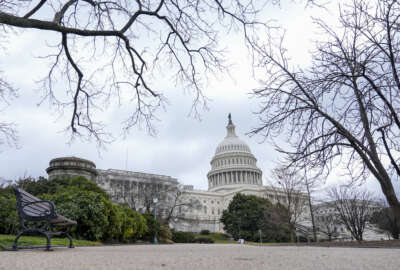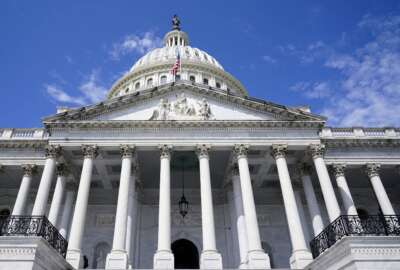Hubbard Radio Washington DC, LLC. All rights reserved. This website is not intended for users located within the European Economic Area.
6-bill minibus rewards some agencies, while slashing budgets for others
Months of tense negotiations and four continuing resolutions later, a new appropriations minibus puts several agencies at or below fiscal 2023 spending levels.
The bipartisan fiscal 2024 spending “minibus” lawmakers agreed to over the weekend leaves many agencies at or below last year’s spending levels.
While the spending package represents a crucial step toward moving several agencies off a continuing resolution and onto more solid spending ground for the rest of the fiscal year, agencies are facing further financial uncertainty for the long-term.
Still, the White House is urging a quick passage of the appropriations minibus.
“This bipartisan legislation represents a compromise and neither side got everything it wanted, but it would prevent a damaging shutdown of several key agencies, protect key priorities and make progress for the American people,” the Office of Management and Budget said in a statement of Administration Policy Tuesday.
The new package includes funding plans for the departments of Agriculture, Justice, Commerce, Energy, Interior, Transportation, Housing and Urban Development, and Veterans Affairs, as well as many smaller agencies.
After the March 8 deadline for passing the six-bill minibus, House and Senate appropriators are expected to turn to the remainder of the appropriations bills, which now have a March 22 deadline.
While agency spending plans appear to be nearing the finish line, what may be top of mind for many federal employees is how the appropriations package affects the federal pay raise for the rest of the year.
At the end of December, President Joe Biden enacted a 5.2% average federal pay raise for most employees on the General Schedule.
Federal employees will continue to receive their higher pay rates that first took effect in January. But the funding will have to come from existing budgets, which may stretch agencies’ spending somewhat thin.
Of course, there are several other key areas where agencies will see spending differences under the new minibus.
Pay for federal wildland firefighters
Unlike the flat or reduced budgeting that many agencies will see under the new minibus, federal wildland firefighters at both the Interior Department and the U.S. Forest Service will be getting more secure resources.
As Congress ran down the clock for reaching spending agreements over the last several months, the frontline employees have come to the edge of a pay cliff many times over.
Now, the 2024 Interior, Environment and Related Agencies appropriations bill maintains a higher pay rate for federal wildland firefighters.
Firefighters first received a pay boost in 2022 as part of the Infrastructure Investment and Jobs Act. Under the infrastructure law, federal firefighters received either $20,000 or 50% of their annual base salary, whichever number was lower.
In addition to maintaining that raise, the minibus keeps current staffing levels for federal firefighters as well.
Advocates of federal firefighters, including the National Federation of Federal Employees, said they were “pleased” with the outcome — and are now setting their sights on future developments for the frontline workforce.
“For months, these selfless men and women have had to live with the possibility of their pay being cut in half overnight,” NFFE National President Randy Erwin said in a statement. “We can now further focus our attention on passing a permanent base pay increase through supplemental legislation.”
Some senators have already started pushing for a permanent pay raise for firefighters as well, under a bill called the Wildland Firefighter Paycheck Protection Act.
A hiring surge for FAA
Employees at the Federal Aviation Administration will also see some added support as part of the appropriations minibus.
The package, under the Transportation, Housing and Urban Development and Related Agencies bill, provides just over $20 billion for FAA. It’s an increase of about $1 billion from the agency’s funding for fiscal 2023.
Roughly $12.7 billion of the funding will go toward a hiring surge for the agency. If the legislation is enacted, FAA will have the funding to hire an additional 1,800 controllers to try to stave off staffing loss due to retiring employees.
Resources from the minibus will also go toward improving training facilities for air traffic controllers and enhancing IT and telecommunications systems.
Additionally, nearly $3.2 billion will be put toward improving FAA facilities and equipment. About $3.9 billion will go toward grants aiming to reduce airport emissions, build new infrastructure at airports and more.
Cuts to spending for EPA, NSF
Although federal firefighters and FAA employees will see stabilized or increased resources, many agencies are simultaneously facing budget cuts under the minibus.
The Environmental Protection Agency will take one of the larger funding cuts as part of the appropriations package.
The minibus provides EPA with just under $9.2 billion — roughly $1 billion less than EPA’s enacted 2023 budget of more than $10.1 billion.
House Republicans were particularly focused on implementing budget reductions for EPA and touted the 9.6% cut included in the package as a success.
But the American Federation of Government Employees, which represents about 7,700 EPA employees, expressed major dissatisfaction with the funding decrease for 2024.
“At a time of climate emergency, the agency budget should be increased, not slashed,” Marie Owens Powell, president of AFGE Council 238, which represents EPA employees, said in a statement Monday. “Our work is mounting … Congress must restore EPA funding in fiscal 2025 and we will continue to raise our voices to make sure it does.”
The minibus, however, maintains current staffing levels across all of EPA’s components. In total, EPA has about 15,100 employees.
At the same time, EPA has been pushing for a hiring surge through separate funding from the Infrastructure Investment and Jobs Act and the Inflation Reduction Act. The agency initially planned to add another 1,000 employees to its roster this year, but its appropriations may now impact the end number.
Along with EPA, the National Science Foundation and NASA will also take hits to their 2024 appropriations.
The minibus gives NSF about $9 billion for the fiscal year, which is $479 million below the 2023 enacted level, and $2.3 billion below the budget request.
NASA will get about $24.5 billion, which is just about $509 million below the enacted level and $2.3 billion below the budget request.
Stagnating pay, staffing at Bureau of Prisons
For salaries and expenses for several Justice Department components — the FBI, U.S. Marshals Service (USMS), Drug Enforcement Administration (DEA) and U.S. Attorneys — the appropriations committees approved a $19.1 billion budget. That’s $1.4 billion below the budget request for 2024.
In total, DOJ will receive a discretionary total of $37.5 billion, representing a significant decrease from last year’s enacted amount. DOJ’s new topline number is $977 million below 2023 funding, and a $3.8 billion departure from the budget request.
On its own, the FBI will see a 6% budget cut. And the Bureau of Alcohol, Tobacco, Firearms and Explosives (ATF) will have their budget reduced by 7% for the fiscal year, according to the minibus.
Perhaps most significantly, the Bureau of Prisons will face budget cuts for the rest of 2024 as well. The minibus includes $8.4 billion for the agency — on par with the fiscal 2023 enacted budget and about $250 million below the White House’s initial proposal for 2024.
While staffing levels and salaries for BOP will remain the same, the agency’s facilities budget will decrease by $180 million, putting it $110 million below the 2023 enacted level. The modest budget comes as BOP continues to face major staffing shortages and attrition challenges.
Brandy Moore White, national president of the AFGE Council of Prison Locals, said she was “extremely disappointed” with the funding proposal.
“Failing to provide the Bureau of Prisons with the funding it desperately needs to address staffing, safety and security issues will make it even harder for employees to do their jobs and make our prisons more dangerous environments both for employees and inmates,” Moore said in a statement.
AFGE National President Everett Kelley said while the union appreciates Congress pushing forward with an actual spending agreement, rather than another continuing resolution, the minibus is “at best an effort to tread water.”
“The six spending bills before Congress this week are far better than the partisan bills the House considered last year, which sought cuts of 20% or more from key programs,” Kelley said in a statement. “At the same time, the appropriations process remains fundamentally flawed. The fiscal year is already half over. Moreover, the inflexible spending targets imposed by the Fiscal Responsibility Act have resulted in damaging freezes and reductions to many vital federal programs.”
Copyright © 2024 Federal News Network. All rights reserved. This website is not intended for users located within the European Economic Area.
Drew Friedman
Drew Friedman is a workforce, pay and benefits reporter for Federal News Network.
Follow @dfriedmanWFED
Related Stories
Congress approves short-term extension to avoid shutdown, buy more time for final spending agreement
Related Topics
All News
American Federation of Government Employees
Brandy Moore White
Budget
Bureau of Prisons
Congress
Environmental Protection Agency
Everett Kelley
FBI
Federal Aviation Administration
federal firefighters
federal pay raise
House Appropriations Committee
Joe Biden
Justice Department
Marie Owens Powell
NASA
National Federation of Federal Employees
National Science Foundation
Office of Management and Budget
Pay
Randy Erwin
Senate Appropriations Committee
wildland firefighters
Workforce





